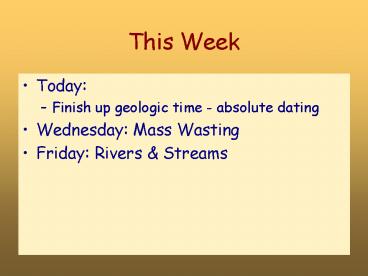This Week - PowerPoint PPT Presentation
1 / 20
Title: This Week
1
This Week
- Today
- Finish up geologic time - absolute dating
- Wednesday Mass Wasting
- Friday Rivers Streams
2
Todays Plan
- Finish relative dating
- Numerical dating methods
- Radioactive decay
- Concept
- Examples
- Activity
- Half-life
3
Fossils
- Single-celled organisms range?
4
Fossils
- Clams (Mollusks) range?
5
Fossils
- Dinosaur range?
6
(No Transcript)
7
Relative Time Scale
- Worldwide changes in fossils give break points
- The relative time scale doesnt give us numerical
ages. - Where do these numbers come from?
8
Absolute Age Determination
- Many methods have been devised to measure the
Earths age - Thickness of sedimentary rocks
- Cooling of the planet (assumed molten initially
with no other heat source) - Saltiness of the ocean
- Radioactivity proved to be the best
9
Your WarmUp AnswersVirtual Dating Exercise
- I took the tutorial, but as I already understood
how radiometric dating works it was rather a
waste of time. - I unfortunately did not get to finish this
tutorial. It was simply too long. But, it was
very educational and helped me understand how
radioactive dating works.
10
Your WarmUp AnswersVirtual Dating Exercise
- I completed the tutorial (it took so long!). The
graphs that showed the decrease of the parent
material as the daughter material decreased were
helpful in showing me the ratio and understanding
the basic concepts more. It was actually kind of
interesting.
11
Radioactive decay
- One element changes to another element (plus a
high-energy particle)
12
Radioactive decay
- Elements that decay
- Uranium, Thorium, Potassium, Rubidium
- Products of decay
- Lead, Strontium, Argon, (Helium!)
13
Example of Radioactive Dating
- Potassium atoms radioactively decay to argon
atoms. - Think of an hourglass with potassium atoms in the
top and argon atoms in the bottom. - A potassium-bearing mineral is the hourglass!
(feldspar, amphibole, micas)
14
Rate of decay
- Chance of decay is constant for each atom in each
unit of time (second, minute, year, million
years) - DEMO Proof of radiodecay
15
Class exercise
- Each of you is an potassium atom in a mineral
(say, feldspar) - Each will decay to argon at a (pseudo-) random
time - Each time unit will be a roll instead of a
millisecond - start as potassium
- Will decay to argon
- Decay is random (roll 6 on die)
16
Decay exercise
- Need accurate count for each time increment!
17
Decay Curve
18
(No Transcript)
19
Radioactive Dating
- What can be dated?
- Most igneous rocks
- Some metamorphic rocks
- Some (few) sedimentary rocks
- Dating sedimentary volcanic layers
- Links dates to fossils
20
Absolute Geologic Time Scale































